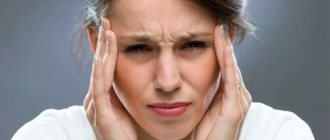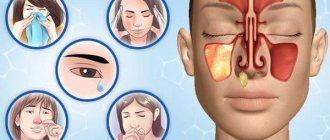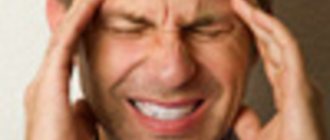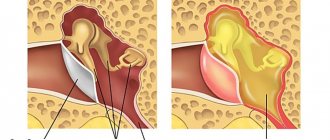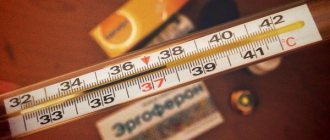Causes
Why does my head hurt? Common causes of headaches are:
- neck muscle spasm;
- compression of the vessels of the head and neck;
- compression of the membranes of the brain;
- brain nutritional disorders: insufficient blood supply, narrowing of blood vessels supplying the brain;
- smoking, poisoning with alcohol, drugs, medications;
- stress, sleep disturbance;
- due to neck and head injuries;
- birth injuries;
- anomalies in the development of blood vessels in the neck and head.
Diagnostics
If you experience frequent headaches, you should definitely consult a doctor.
Diagnostics includes the following activities:
- Examination and interview of the patient. The doctor determines the intensity, nature of cephalalgia, and provoking factors. The patient is asked to keep a self-monitoring diary, where he writes down all his sensations. Based on these records, the dependence of attacks on blood pressure, sugar levels, and time of day is monitored. Intensification of headaches in the evenings, after physical activity or stress allows us to make a preliminary diagnosis.
- Laboratory research. There are no pathognomonic changes in the analyses. The examination is carried out to identify inflammatory changes.
- Ultrasound of the vessels of the neck and brain. Allows you to determine the degree of narrowing of the arteries and the nature of the cerebral blood supply.
- X-ray, MRI of the cervical spine. This is done to detect intervertebral hernias or vertebral deformities.
- REG, EEG. This is a recording of the electrical activity of neurons and blood flow in the vascular system of the brain.
- CT or MRI of the brain. Such a study is necessary to identify organic pathology.
If necessary, perform a lumbar puncture (for meningitis), glucometry (for diabetes mellitus), and blood pressure measurement (for hypertension).
Primary headaches
| Name | Symptoms |
| Migraine | Throbbing pain in the head, most often occurring after sleep. The severity of the headache ranges from moderate to unbearable. The pain is felt on one side of the head: in the right or left temple, forehead, crown. Migraine lasts up to three days, often accompanied by nausea and vomiting. A person does not tolerate bright light and loud sounds. Migraines can be caused by stress, insomnia, or changes in weather. The tendency to migraine is inherited. |
| Tension headache (TTH) | A pressing headache covers the entire head or separately the back of the head, crown, forehead. Cephalgia can be severe. A tension headache attack can last up to 7 days. At the same time, my head hurts every day. TTH occurs due to emotional or physical stress. |
| Cluster headache | Unbearably strong shooting pain in the head. It is felt on one side, in the forehead and eye area. Cluster pain causes redness and swelling of the face and lacrimation on the pain side. Due to a severe headache, a person behaves restlessly. |
| Headache and facial pain due to trigeminal neuralgia | Very strong short-term stabbing pain in the head. The pain is felt in the crown, forehead, and can affect the face and teeth. The headache attack lasts several hours. In this case, spasm of the facial muscles may occur. |
Secondary
Secondary headaches can be a sign of other diseases. Most often it is caused by the following diseases:
| Cause of headache | Manifestations of the disease |
| Cervical osteochondrosis | Headache appears with a sharp turn of the head, prolonged neck tension, or an uncomfortable position of the head during sleep. The pain intensifies in the morning, often spreading to one side of the head. May be accompanied by hearing loss in one ear, tinnitus, and spots before the eyes. |
| Flu or cold | The headache is not very severe, localized in the forehead, eyes, temples on one or both sides. In addition to the headache, the patient’s temperature rises above 37 degrees, a runny nose, cough, sore throat and other cold symptoms appear. |
| Increased intracranial pressure | Prolonged frequent headaches are combined with nausea and vomiting. A person often feels sick in the morning. If these symptoms and mild headaches occur, you should consult a doctor. |
| Brain concussion | The headache may last for several years after the injury. Accompanied by anxiety, irritability, decreased concentration, and dizziness. The person may suffer from depression. |
| Vegetovascular dystonia | Causes dizziness, nausea, neurotic disorders, and surges in blood pressure. Exacerbations occur with weather changes and emotional overload. |
| Hypertonic disease | A bursting headache is felt in the back of the head. Combined with heat in the head, dizziness, noise in the head, spots before the eyes, staggering. A person may feel nausea and heart pain. |
| Sinusitis, sinusitis, sinusitis | Chronic long-term pressing headaches in the forehead, eyes, cheeks. Accompanied by nasal congestion, runny nose, and slight fever. |
| Horton's headache | Characterized by attacks of severe boring pain. It spreads around the eye, temple and forehead. The attacks usually occur at the same time. This type of headache is more common in men. |
| Hypertonic disease | A bursting headache is felt in the back of the head. Combined with heat in the head, dizziness, noise in the head, spots before the eyes, staggering. A person may feel nausea and heart pain. |
Causes of headaches at night
Pain in the head at night can occur in a healthy person or be a symptom of various diseases. If they appear once, this may indicate unsuitable sleeping conditions or other external factors. However, chronic pain that worsens at night requires diagnosis and treatment from a specialist. There are a number of diseases and conditions that can be detected during the examination.
Hypertension
High blood pressure is a common cause of headaches day and night. Hypertension occurs when blood pressure increases on the vascular walls. This may be due either to increased vascular tone or to the accumulation of excess fluid in the body.
Hypertension can be identified by the following symptoms:
- acute headaches, which can intensify with a lack of oxygen, after exercise or long rest;
- attacks of nausea, dizziness;
- redness of the facial skin.
In some patients, blood pressure is constantly elevated, but often the disease manifests itself in attacks. Normal values are 120∕80 mm. rt. Art. Their increase to 140∕90 or more can be caused by stress, physical activity, climate change and other factors. To treat chronic hypertension, drugs are used to strengthen and relax the vascular walls, as well as diuretics.
Increased intracranial pressure
Intracranial hypertension is a chronic disease that manifests itself as acute headaches. Pathology manifests itself as the difference between atmospheric pressure and the indicator in the cavities of the skull increases. Here, pressure is exerted by several structures: blood in the vessels of the head, fluid of the cerebral ventricles and brain tissue.
Intracranial hypertension is manifested by characteristic symptoms:
- pain in the head at night and in the morning;
- various sleep disorders;
- disorders of the nervous system;
- deterioration of memory and attention, decreased concentration.
The diagnosis of intracranial hypertension is made based on clinical signs. It is impossible to accurately measure this indicator because it includes several factors. To diagnose its cause, an MRI of the head is prescribed and blood flow in the cerebral vessels is examined. During attacks, brain tissue receives insufficient oxygen and nutrients, which leads to chronic ischemia and increases the risk of stroke.
Histamine disease
Histamine disease (Horton's migraine ) is a chronic disease, the cause of which remains unclear. Excess histamine accumulates in cells and tissues, which causes a typical clinical picture. The patient begins to have a headache at night, and the attacks of pain are acute, but short-lived. Additional symptoms are also identified:
- unilateral headache during sleep;
- lacrimation, swelling of the eyelids;
- swelling of the nasal mucosa, difficulty breathing.
During an attack, dilation of the carotid arteries is determined. However, more often the headaches are short-lived and go away before the doctors arrive. A characteristic sign of the disease is an increase in the clinical picture after histamine injections. Treatment consists of painkillers and steroidal anti-inflammatory drugs.
Poisoning
Intoxication is one of the reasons why you get a headache at night. Poisoning can occur after consuming low-quality foods and alcohol, being bitten by insects, inhaling toxic gases, or coming into contact with chemicals. There is also a distinction between drug poisoning, which is often associated with dosage violations.
Toxins spread through the bloodstream and reach the brain. This leads to tissue ischemia, nerve conduction disturbances, and acute headaches. It is important to provide first aid in case of poisoning in a timely manner. If an antidote is known, it is immediately administered in the required dosage. In other cases, gastric lavage and drip administration of electrolyte solutions are indicated to reduce the concentration of toxins in the blood and prevent dehydration.
Sleep apnea
Obstructive sleep apnea is a chronic pathology in which breathing stops for more than 10 seconds during sleep. It may be associated with the anatomical features of the structure of the tongue and lower jaw, as well as with the patient’s excess weight. Due to the blockage of the oropharynx, air is retained and does not flow through the respiratory tract. The diagnosis can be made based on typical symptoms:
- headache at night and upon waking;
- insomnia, sleep disorders;
- during the day – chronic fatigue, fatigue, deterioration of memory and concentration;
- snoring in your sleep.
Sleep hypopnea is a condition in which breathing does not stop completely, but not enough air enters the lungs. Cells and tissues, including the brain, experience oxygen starvation, which is accompanied by frequent headaches. In addition, patients with sleep apnea and hypopnea are at risk of stroke and chronic diseases of the cardiovascular system.
Other reasons
There are both pathological and physiological causes of night headaches. They are associated with internal or external factors that cause impaired cerebral circulation or intoxication in the absence of acute and chronic diseases of internal organs. So, night headaches can be triggered by the following factors:
- sleeping in a stuffy room, lack of oxygen and high gas pollution;
- drinking alcohol or fatty foods before bedtime;
- lack of physical activity;
- mental or physical fatigue;
- stress, tension.
Even a healthy person can have a headache during sleep. If this happens rarely and is associated with external factors, it is enough to devote time to preventing headaches. However, frequent attacks are not normal and indicate the need for a full examination.
When you can't put off visiting a doctor
- For an acute headache that suddenly arose and resembles “a blow to the head.” This may be a symptom of subarachnoid hemorrhage. Call an ambulance immediately.
- The pain intensifies when lying down and goes away half an hour after getting out of bed. This is a sign of impaired outflow of cerebrospinal fluid, increased intracranial pressure, and a tumor.
- If the headache appears regularly, is intense, is associated with changes in body position and changes with movement.
Treatment
Treatment for headaches depends on their cause.
Some simple methods can reduce the likelihood of headaches:
- frequent breaks at work
- do not sit in hunched or tense positions
- move as often as possible
- drink more water throughout the day
- healthy eating
- avoid headache triggers such as alcohol
- regular eye examination
- wearing lenses prescribed by your eye doctor
Migraines can be more difficult to treat, but a combination of medications and lifestyle changes can often help.
Headaches caused by blood pressure may require lifestyle changes, blood pressure medications, or other treatment.
If a stroke or aneurysm causes a headache, then the person needs emergency help.
